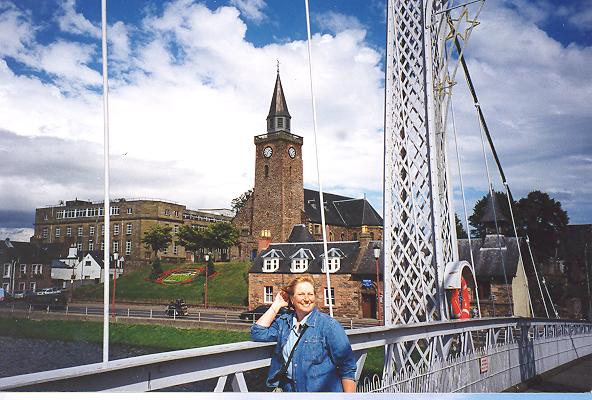Posing on a bridge in Inverness, Scotland, 1999
I was sick as a dog. She went shopping.
Driving my new Jeep Wrangler
in the desert is lots of fun.
This lead sentence is an
experiment. I suspect that someone
or some thing (organization) is trolling through the blogosphere looking for
references to something that can be sold.
At least that is the only plausible explanation I can see for the fact
that my innocent little blog of October 21st has had about five
times the average number of “hits”.
It wasn’t particularly clever, or particularly important, but I did
mention my nw jeep. We will see –
I will report in a “comment” in a few days.
I am taking a botany
certification course, thinking about studying to become a “field master” for
the paleo people, hiking in the desert whenever I can to build up some stamina,
helping to re-write the geology section of the paleo certification course, cooking my own meals, and cleaning the
house every month or so. This
leaves me darned little time to pursue my principal long-term goal: to win the
Nobel Prize in Medicine for curing ovarian cancer. Besides, Dick Ingwall has been under the weather (or the
NYTimes is tired of writing about medicine), and the NCI Cancer Bulletin has
ceased publication. This means that I will have to do my own research! I have some plans: I am thinking about profiling the work
of each of the young investigators that the Rivkin Center has supported in
recent years. As there are upwards
of 50 of them, I can keep busy.
Soon.
But, in formulating this idea
I ran onto some interesting facts.
(1) The Fred Hutch program I attempt to help has been awarded research
grants of $36 million over the past 15 years (eat your hearts out,
geologists!); (2) the Research
Department of the U. Michigan Department of Surgery consists of 56 people at the
Ph.D. or M.D. level, which together represent well over 300 – more like 450 -
person-years of post-graduate education.
We haven’t cured cancer yet, but nobody can say we’re not trying.

I think profiling the researchers at the Rivkin Center would be really interesting. Good idea.
ReplyDeleteOf course 'go shopping'! Linda seems to be having plenty of fun in this glamor shot. She must have found some wonderful things to buy.
ReplyDeleteONLY $36 mil - peanuts! That's only averages $2,400,000/yr. One health insurance company (name any of them) pays their top few Exc's more than that in ONE year! Those researchers (any biological researchers) have to scramble, beg, pray for funding. And all those research investigators are competing for the same shrinking pie chart of dollars. Biological systems are amazingly, beautifully complicated, 'proof' is hard to prove, countless political hoops to jump through. Is it any wonder we're still where we are in healthcare?
God bless these scientists that dedicate their life to research. How difficult it is to design an experiment to try to answer any question, and then you end up with 'iffy' results not worth publishing. You never hear of those 'failed' experiments, or the 2+ years it took to get to that point. The MD's in the surgery dept. at U of M are expected to teach & do surgery too! There aren't enough hours in the day...
There - now I feel better.
Here's some thoughts by David Schneider on why biological systems are so complex and hard to unravel in the process of trying to understand the basic controlling mechanisms. Recently there have been several studies that have revealed that many if not all of the so-called silent or inactive genes (which greatly outnumber genes that have known functions) do indeed have specific roles. I wish I had better knowledge of these newer findings, but I understand that in many cases these "silent" genes are involved in the control of the better understood genes. Activation of genes is usually triggered by some change in the environment of the biological system. The change is often a chemical change but can also be some sort of physical factor. Imagine the complexity that this introduces to the task of an experimental biologist. When trying to replicate experiments, there are probably very small, seemingly unimportant, changes in the environment of the biological system which may have some effect on the control processes of the biological system being studied. With the increasingly evident complexity of even the genetic control processes,no wonder that cancer research seems to be progressing so slowly. I can only hope that as we begin to understand the complex web of control mechanism, more break-throughs in cancer research will follow.
ReplyDeleteThanks, Dave. I have read that much of the 98% of DNA once considered "junk" actually codes for regulatory molecules., I guess I can understand how the environment - experience - could effect the behavior of these molecules. But, for the life of me, I can't see how such things can be inherited. To do that would mean that the environment can alter the genetic structures that code for the regulators. In other words, if the environment - dryness, for instance - can feed back into the behavior of a molecule that controls the behavior of as gene that causes thirst, well and good. But how can that be inherited?
Delete